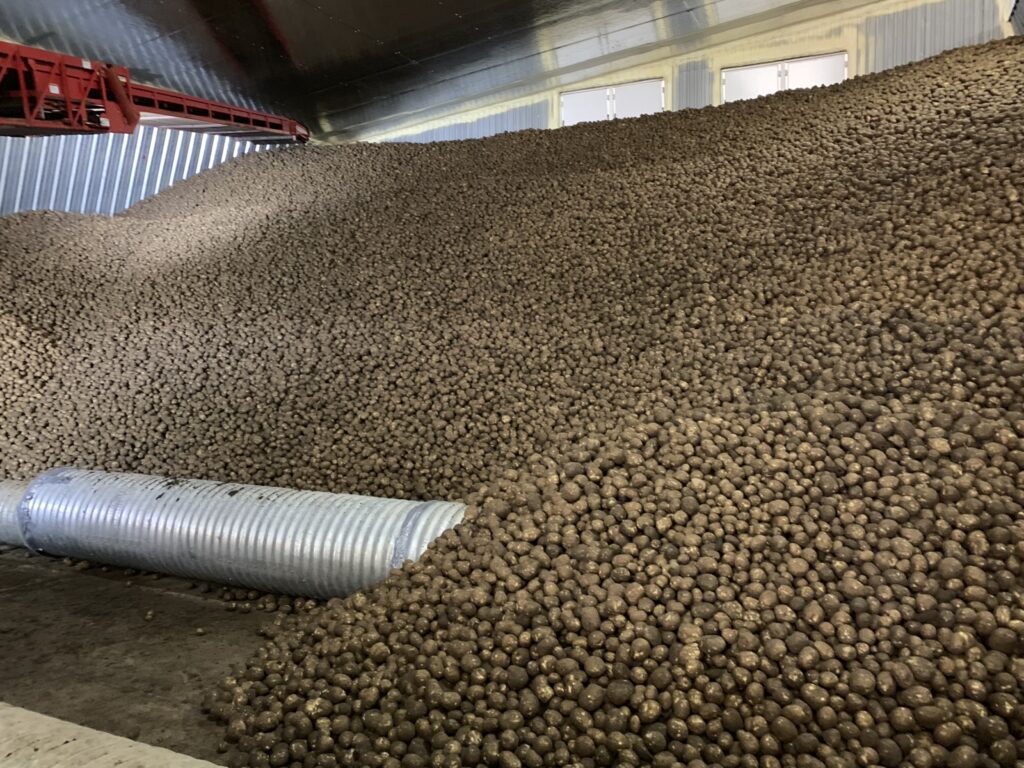
Potato storage 101: Fundamentals at work
The main rule of potato storage is a simple maxim: You get out what you put in. In other words, disease management is best addressed in the field, not after the crop is harvested.
“It’s not a hospital,” said T.J. Kennedy, vice president of operations at Heartland Farms, a potato and vegetable farm in Hancock, Wisconsin. “You can’t make a potato better. So doing everything to the best of your ability to put them into storage in good shape is priority No. 1.”
Heartland Farms, family owned and operated since 1873, has on-site potato storage capacity of more than 5 million hundredweight. Once potatoes are in storage, a main area of focus is managing humidity levels and temperatures.
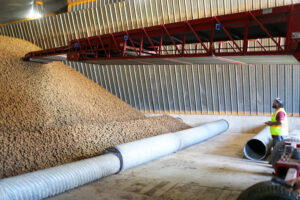
“Managing CO2 levels is very important,” Kennedy said. “Fresh air is very critical. A potato’s just like a human being. It gives off CO2. It breathes oxygen. The vast majority of the potatoes we grow are for chips or processed, where you need to manage the sugar levels. You need to make sure that you’re getting adequate oxygen through that pile.”
Refrigeration is also key. In Wisconsin, temperature swings in the fall or spring that produce prolonged stretches of warm weather are not uncommon, Kennedy said.
“In the world we live in, with climate change, there’s more refrigeration needs for potato storage today than there was 30 years ago, which helps the overall quality of the potato,” he said. “They can continue to get fresh air and cooling.”
Managing all those components is key to what Manitoba, Canada-based manufacturer Meridian Archwall Steel Buildings does.
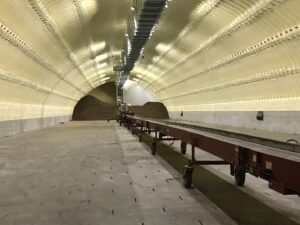
Chad Kleisinger, director of international business, oversees a symbiotic design-to-manufacturing process that connects potato growers with builders and air companies to produce storage buildings customized to growers’ needs.
The company considers several factors in the design and manufacture of storage buildings, Kleisinger said. Seed potato growers generally require less air volume and no refrigeration, while fresh potatoes aren’t stored as long as those planned for processing.
“We really start by working with the grower for what his needs are,” Kleisinger said. “We figure out a timeline and we come up with a volume that they’re going to store, and then we take it to our dealer, our builder.
“They crunch all the numbers. They figure out what it’s going to take to get that and work with the air companies to size everything correctly.”
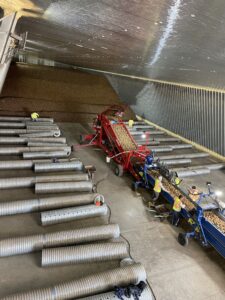
Growers are given a hundredweight price, and everything from door sizes to expansion plans are factored into design decisions orchestrated by the company’s in-house engineers, detailers and building team.
Meridian Archwall is a product line and a division for Behlen Industries LP Canada, which produces other buildings including airplane hangars and fire towers, overseen by Klesinger. But potato storage facilities “kind of have my heart,” said Kleisinger, who comes from a bulk farm fuel supplier business background and a canola and wheat farming region and has been with the company for 15 years.
Potato farmers, he said, are “honest and good people (who) see three, four, five years in advance.”
Meridian Archwall is also forward- looking in its services, which have rebounded since COVID-19 snarled supply chains and cut into the availability of steel, concrete and rebar, Kleisinger said. And he has some advice for growers who may be in the market for a new storage facility.
“What I feel is important is for the grower to really take time to see what’s going on in the industry,” he said. “It’s all at our fingertips now. We can check stuff on our mobile phones. But I still think, kind of being a little bit old-school, that you need to get out and see what your friends are doing. You need to go to other regions.”
In Wisconsin, Heartland Farms finished planting potatoes in early May, and hilling has been completed, Kennedy said.
“Now we’re into the growing part of the season where we’re focusing on water and crop protectants, crop nutrients,” he said.
The farm ships chipping and fresh market potatoes from August through June.
Kennedy, who’s worked for Heartland Farms since 1998, has been a part of decades of growth for the operation, which now farms around 27,000 irrigated acres.
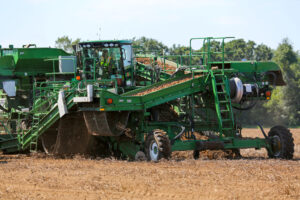
Other crops produced are sweet corn, canning peas, green beans and soybeans, with all vegetable crops sold to Wisconsin food processors.
One of the biggest changes Kennedy has observed throughout the years has been the technology explosion that “has made us faster, smarter, able to manage more,” including drones now in use at the farm, he said.
Seeing the results of hard work come harvest time is what has kept Kennedy in the potato business.
“Farming is a challenge. Very long hours,” Kennedy said. “You’ve got to deal with Mother Nature and what she may throw at you.
“The rewarding part to me is all of the efforts that the team puts in and to see the rewards at the end of the year in the crop at harvest time. The way I’m wired, I love the challenges. I love to have to adapt to the changing seasons, changing weather. That drives me.”







